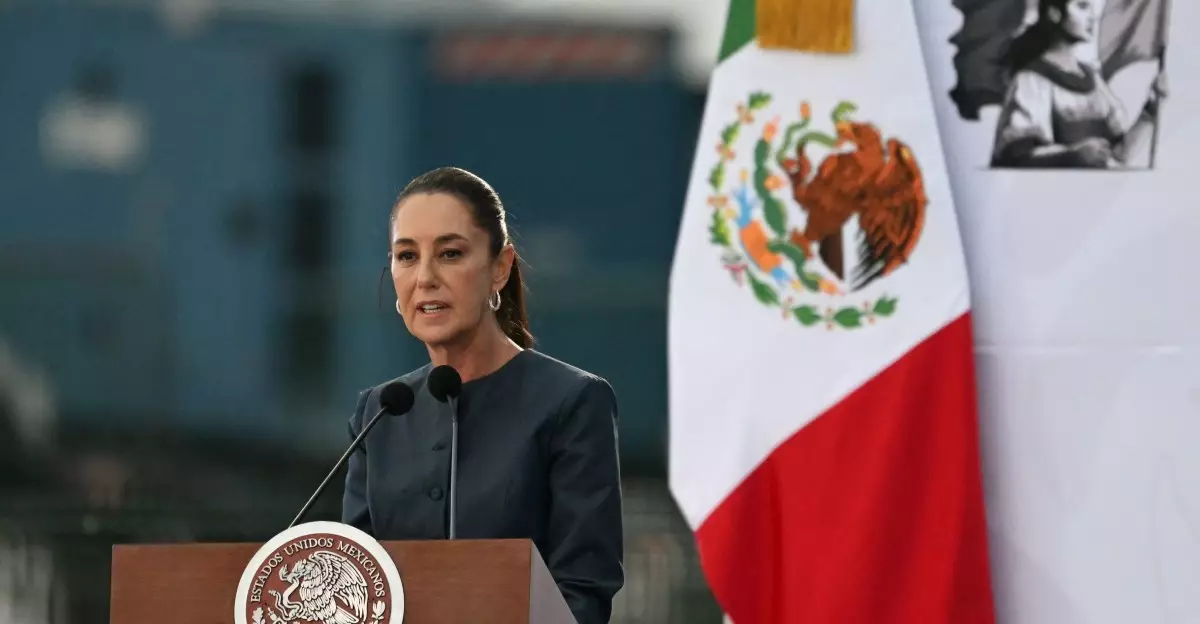In a world where territory and identity intersect in complex ways, the recent dispute between Mexico and the United States over the naming of the Gulf of Mexico illustrates the profound impact of geopolitics on cultural perception. This conflict, ignited by former President Donald Trump’s administration’s directive to refer to the Gulf as the “Gulf of America,” has provoked a spirited response from Mexican President Claudia Sheinbaum. The implications of such a seemingly trivial nomenclature extend far beyond mere semantics; they strike at the core of national identity and sovereignty.
Claudia Sheinbaum’s Legal Standpoint
In a bold legal maneuver, Sheinbaum announced that her administration intends to sue Google for altering the nomenclature of the Gulf in its mapping services. The decision echoes Sheinbaum’s earlier warning that Mexico would take legal action should the company continue to disregard the geographic boundaries recognized by international law. She has articulated a clear and passionate defense of Mexico’s territorial integrity, claiming that any rebranding of the Gulf must respect the countries that border it, emphasizing the principle that the U.S. cannot unilaterally impose its naming conventions on international waters.
The Mexican government’s lawsuit challenges a larger trend where tech platforms serve as conduits for political narratives that may not uphold the principles of fairness and recognition of sovereign rights. Sheinbaum’s administration has made it clear: the territorial waters of Mexico cannot be rebranded by U.S. decree. By bringing legal action against Google, the Sheinbaum government affirms the importance of jurisdiction in geographic naming, a seemingly mundane aspect of maps that carries significant cultural weight.
International Perceptions in the Age of Technology
The use of geographic nomenclature in services as ubiquitous as Google Maps illustrates the deep-seated power dynamics at play. For many, especially in the realm of technology, the casual mutability of geographic labels might appear innocuous. However, when a significant entity like Google complies with political directives—while global voices like Sheinbaum advocate for the preservation of established geographic identities—one must question the influence of corporate policies on global perception and identity.
Sheinbaum’s emphasis on compliance with international laws reflects a broader call to action against the overreach of political entities on cultural representations. The naming of geography is not simply an administrative detail but an assertion of identity. In a world where technology shapes much of our understanding of geography, it is crucial that these platforms respect international demarcations and the sentiments of local populations.
A Fight Beyond the Maps
This struggle over the Gulf’s nomenclature extends into wider cultural implications. The naming debate invokes questions about historical relations between nations and the legacy of colonial practices of imposing identity. Just as Sheinbaum has criticized the unilateral actions of the U.S. government in renaming the Gulf, it also serves as a reminder of the necessity for contextual understanding in global citizenship. Renaming a body of water might seem trivial, but such acts are often viewed as assertions of dominance over cultural narratives.
This controversy is not just a Mexican issue; it resonates with numerous nations grappling with how foreign powers shape their identities through language and representation. The tools we use to navigate the world—maps, for instance—become battlegrounds for cultural wars, where every label carries the weight of history and authority.
Wider Implications for Tech Accountability
As tech companies like Google and Apple engage in these politically charged disputes, their roles are increasingly scrutinized. Can corporations, which thrive on global standards, truly balance competing national identities without taking sides? Should they remain neutral, or will they inadvertently become arbiters of national sovereignty? The lawsuit led by Sheinbaum raises these crucial questions about the responsibilities of technology firms in an increasingly intertwined world.
The actions taken in the upcoming months surrounding this lawsuit could herald a new era of accountability among tech giants. As nations assert their identities in an age of globalization, the decisions made regarding how we define and denote our geography will ultimately influence the discourse surrounding nationalism, identity, and power dynamics across the globe.
In this ongoing saga, Mexico’s determined pushback against the renaming of the Gulf of Mexico exemplifies the necessity of respecting the rich tapestry of cultural identities in our increasingly digital world—reminding us that even in maps, every name holds significance.

